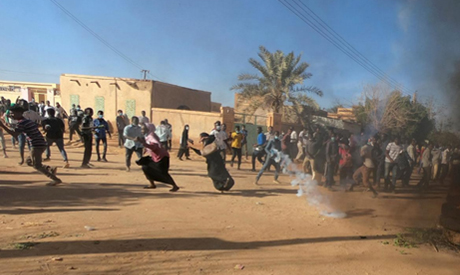
Sudanese demonstrators run from a teargas canister fired by riot policemen to disperse them as they participate in anti-government protests in Omdurman, Khartoum, Sudan, January 20, 2019 (Photo: Reuters)
Clashes between Sudanese security forces and protesters holding a large anti-government sit-in outside the military's headquarters in the capital Khartoum killed at least 11 people including six security forces, the government's spokesman said Wednesday.
Information Minister Hassan Ismail, who also serves as the government's spokesman, did not give further details on the violence a day earlier.
Sudanese security forces tried again to break up the sit-in, which began over the weekend, killing at least 14 people on Tuesday, activists behind the demonstration said, disputing the government's figure.
Attempts by security forces to break up the sit-in have killed at least 22 since Saturday, including five soldiers who protest organizers said were defending the sit-in.
The demonstration is the latest in nearly four months of anti-government protests that have plunged Sudan into its worst crisis in years. The protests initially erupted last December with demonstrations against a spiraling economy, but quickly escalated into calls for an end to embattled President Omar al-Bashir's 30-year rule.
Sudan's state news agency meanwhile said the country's ruling party will organize a rally this week in support of al-Bashir, who has weathered four months of protests calling for his resignation.
SUNA reported that the National Congress Party is planning a rally for Thursday in Khartoum.
The protests against al-Bashir gained momentum last week after Algeria's President Abdelaziz Bouteflika, in power for 20 years, resigned in response to weeks of similar protests.
Saturday's marches marked the 34th anniversary of the overthrow of former President al-Nimeiri in a bloodless coup. It was one of the largest turnouts in the current wave of unrest.
The military removed Nimeiri after a popular uprising in 1985. It quickly handed over power to an elected government. The dysfunctional administration lasted only a few years until al-Bashir _ a career army officer _ allied with Islamist hard-liners and toppled it in 1989.
Al-Bashir has banned unauthorized public gatherings and granted sweeping powers to the police since imposing a state of emergency last month, and security forces have used tear gas, rubber bullets, live ammunition and batons against demonstrators.
Security forces have responded to the protest movement with a fierce crackdown, killing dozens of people.
Short link: